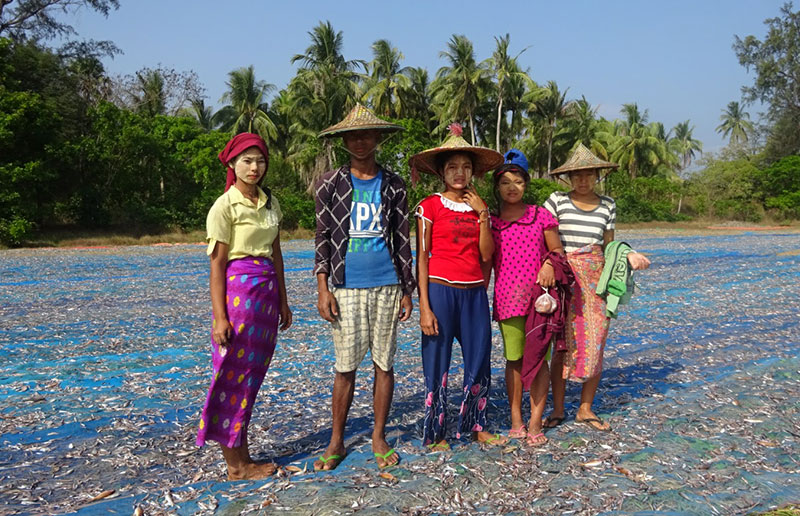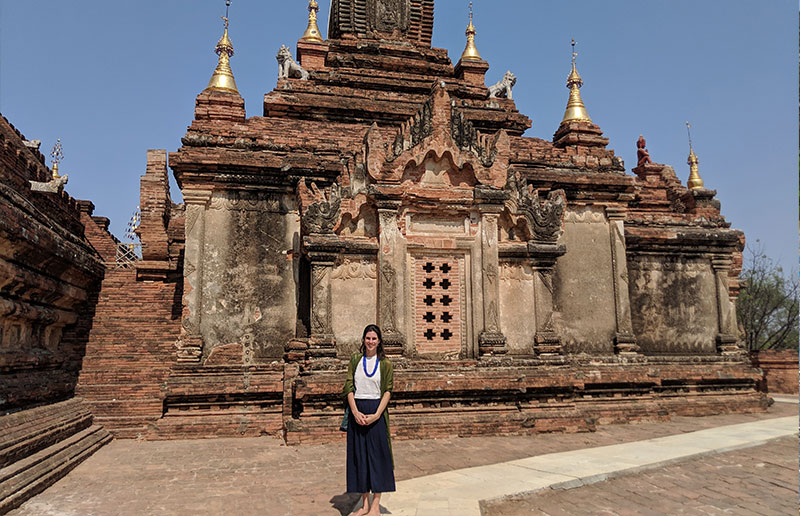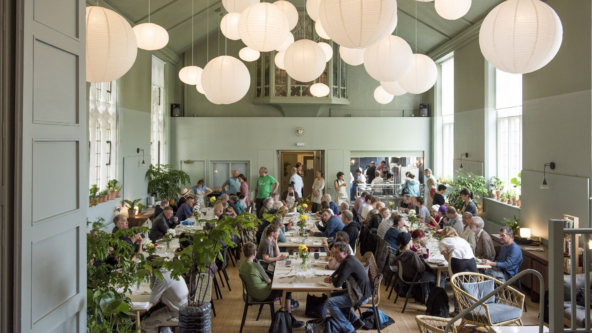Felicia Kodderitzsch is back from her month-long placement with educational charity Prospect Burma, and ready to share her experiences with us.
Back in January 2019, we spoke to Felicia Kodderitzsch as she geared up for her month-long placement with The International Exchange – an organisation that links volunteers with social initiatives around the world. Felicia worked with Prospect Burma, an educational charity in Myanmar that sponsors students to complete their higher education abroad.
Now she’s back, and ready to give us her week-by-week lowdown on everything she learnt in Myanmar – from finding balance in the everyday to understanding the importance of education.
Week 1: keeping an open mind
When you’re heading into unfamiliar territory, without knowing what to expect, I think the best thing to do is to go into it with an open mind. I had a plan of action for the charity, but everything else was up in the air – just the way I wanted it.
I was sent here to help Prospect Burma: a British charity established in the UK in 1989. They only set up their Yangon office in 2016 after government changes in the region made it possible. The majority of their funding still comes from the UK, but they’re currently looking to move some of these activities to Myanmar. That’s where I came in: mapping out the Myanmar fundraising landscape with a plan of action.
How Prospect Burma makes a difference
Prospect Burma’s main purpose is to provide scholarships for eligible students, regardless of religious or ethnic background. They give these students the chance to complete their higher education in universities around the world. After military rule suppressed independent thought and closed universities in 1988, the standard of education in the country fell rapidly.
But now that universities are open again, Prospect Burma hopes their scholars will return to Myanmar and give back. Eventually, they aim to help the country build a better future, and repair the economic and social damage that has arisen through a lack of education.
Settling in
My first week focused on getting an understanding of Myanmar, Prospect Burma, and their obstacles to fundraising. Their Yangon office is based in a small apartment just above a shopping mall. I met Mawia, the Country Director, Shwe, the Programme Officer, and Yupar, who’s in charge of finance. They were all super nice and shared their knowledge and opinions with me.
We never ran out of conversation and laughed a lot. I rarely felt like an outsider with them – we had a lot more in common than I thought!
Having visited the charity’s London office, I had a basic idea of some of the challenges over here. But being in the heart of the action revealed a lot more issues than I imagined.
Prospect Burma is an organisation with an incredibly wide outreach, minimal overhead costs and a real need for funds. There’s a big misconception in Myanmar that because it’s a British charity, it’s a well-funded International Non-Governmental Organisation (INGO). But that’s just not the case.
The fundraising landscape
Convincing people to donate towards higher education when some children lack the means to attend even basic education is difficult. The quality of education in Myanmar remains one of the lowest in the world. Completing a Bachelor’s degree here is worthless if not followed up by expensive vocational training.
The vast majority of Prospect Burma’s students return to Myanmar after graduating. They use their skills to set up clinics, education centres, start their own NGOs, or have corporate careers. So far, around 1,500 Myanmar people are part of the growing alumni network. The impact of the ‘Prospect Burma Multiplier Effect’ is incredible.
The more people donate, the more they’re investing in their country’s future. We just have to convince them!
Week 2: the impact of education
After two weeks in Myanmar, I was completely in my element. I’ve learnt so much from my colleagues, alumni and other Myanmar people about the power of education and important organisations like Prospect Burma. We all know education is important, but when you learn about life without it, it’s a real eye-opener.
Even if the education system in Myanmar could change overnight, it wouldn’t have an impact on the labour market for another generation. The mentality around education would have to be changed across the entire country. It would take dedicated teacher training, and syllabuses. There’s a long way to go but I’ve met so many passionate, ambitious people from all walks of life that can’t wait to get there.
A long history
Before arriving in Yangon, I knew a fair bit about the country’s recent history and had a hunch that the education situation wouldn’t be great.
Having spent my high school years in Vietnam where many of my textbooks were illegally photocopied – they were banned by the Communist government – I had a basic understanding of what educational censorship looks like in action.
What I wasn’t prepared for was the active dismantling of an entire education system. It showed me how important Prospect Burma’s work really was. Schools and universities in Myanmar were heavily affected by 60 years of military rule. And Prospect Burma fight to undo the damage.

Seeing the work in action
I got the chance to chat to some of the students when they came to visit Prospect Burma’s offices. Along with providing scholarships, they help younger kids become eligible with their Access to Learning programme.
It gives disadvantaged people the opportunity to gain a quality education that will change their lives forever, and build up the skills required to progress onto a dedicated scholarship programme.
Seeing the younger students in discussion before their exams really showed me how much this means to them. They’re the future generation who will change Myanmar – I was looking at the start of a new era for the country.
Week 3: enjoying my own company
In the weeks leading up to my TIE adventure, I wasn’t the least bit worried about cultural differences, language barriers, or projects I’d be working on. My only worry was about being alone – which, if not done by choice, I equated to loneliness.
While I was there, I asked my colleague Shwe (who is my age) what made her happy and she said that it was spending long periods of time alone. She said people think she’s weird because of it, but I was pretty envious of her and others like her who are totally content with their own company.
Back in London, I rarely leave my comfortable bubble of being surrounded by people. In short: being alone isn’t a thing I do or something I enjoy.
While I’ve done a few solo travels in the past, I didn’t love them. Not because I was worried about anything going wrong, but simply because I get a thrill out of sharing memories with people. But here I was, on the other side of the world in Myanmar with most meals, evenings and weekends at my disposal.
So, I kept myself busy with early morning walks in the sun, exploring the city, or just putting all I had into my work.
Making a difference
However, at this point, I was starting to feel like I wasn’t achieving enough. Most of what I was doing was just having conversations with the team. I had to take a backseat and really be an active listener, which wasn’t something I’m totally used to.
But then I saw just how useful this was. All that listening meant I could see where processes in the charity were too complicated, especially when it came to locking down potential fundraisers.
The team on the ground didn’t have as much time to dedicate to fundraising as they wanted. And the perception that they were a large international body created a serious barrier between them and locals.
I suggested driving home the storytelling aspect of the charity, leaning on alumni that returned to Myanmar to foster positive communities.
For example, one alumnus returned and set up a number of nurse training clinics. Another came back and started an online digital library. Both had a huge impact on Myanmar – we just needed to get those stories out there.
I planned to hand over a lot of the fundraising processes and networking to the team, so I took team members through a lot of simple things like mail merging, drafting emails and developing a targeted Facebook strategy that would give them a platform to highlight alumni achievements.
It gave them new ways to connect with alumni and past successes, and a plan for establishing mentorship communities. I hoped this would raise Prospect Burma’ reputation locally. It was useful for the team, helped free up a lot of their time and gave their fundraising a clear direction.
Week 4: the final week
I had arrived in Yangon in jeans and a jumper, sleepy from a long flight. Fast-forward four weeks and I was sitting in a café by Inya Lake, dressed in traditional Myanmar fabric and feeling full of energy despite the humidity, heat and lack of sleep.
Reflecting on the trip
I’ve witnessed some strange and incredible things over the last four weeks. But I’ve been absolutely blown away by the kindness I’ve been shown by my Prospect Burma colleagues, their friends and families, and complete strangers.
One thing I’ll cherish forever is being invited into someone’s family life. It makes for a wonderful sense of belonging. The invitation to join my colleague’s family trip to a pagoda festival – something that is normally ‘off-limits to foreigners’ – was amazing.
An incredible opportunity to get a rare glimpse into Myanmar culture. Both spiritually and otherwise, this was a big deal for the family, and I felt so special to have been part of it.
I felt positive about the plans set in place for Prospect Burma. It ended up being all about developing the team’s knowledge and creating a fundraising plan that suits them, bit by bit.
I didn’t get to do too many site visits. Instead, I handed over a lot of my thinking and networking, including ready-to-go emails and contacts for the team to get started on. When I arrived, team members were a bit apprehensive about taking on more ‘tech-y’ things like Facebook, mail merge, etc. It ended up being a great learning opportunity for me to really take time to make things less intimidating and highlight the main objectives of what we’re trying to achieve.
With the right strategy in place, I was confident that the team would really make a real difference in Myanmar, and pave the way for future generations.

Forever grateful
Thank you to TIE – the opportunity to visit Myanmar and immerse myself in a new world is something I’ll never forget. I learnt so much about patience, listening and understanding from my wonderful Prospect Burma colleagues. The conversations I had with team members will stay with me forever – they made me feel so welcome when I was so far from home!
I hope the processes I’ve set up will help the charity establish itself in Myanmar and reconnect with locals. They do incredible work and can have such a positive impact on the country. Despite their hardship, people in Myanmar focus on the little things and make them count.
That’s what’s fuelled me with energy over the four weeks. And I’m grateful for all the unforgettable encounters I experienced.
Interested in a volunteer placement overseas? Find out about opportunities available through The International Exchange.


